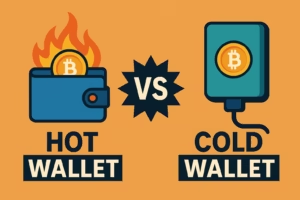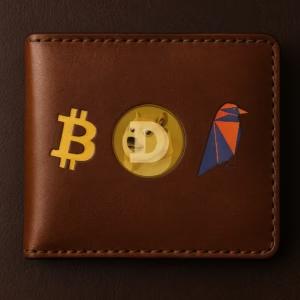What is a Crypto Wallet? (Hot vs. Cold Explained for Canadians)
What is a Crypto Wallet?
You may be asking, What is a crypto wallet? What is a crypto wallet? A crypto wallet is a tool that lets you store, send, and receive cryptocurrencies like Bitcoin or Ravencoin. But it doesn’t actually hold your coins — it stores your private keys, which are like secret passwords that give you access to your crypto on the blockchain.
Without a wallet, you’re relying on an exchange to manage your coins — and that means more risk.
Whether you’re mining crypto in Manitoba or trading in Toronto, knowing how crypto wallets work is the first step toward protecting your assets.
Crypto Wallet Types: Hot vs. Cold
There are two main types of crypto wallets: hot wallets and cold wallets. Each has its role depending on how you use crypto.
Hot Crypto Wallets
Hot wallets are connected to the internet — which makes them convenient, but less secure for long-term storage.
Examples: Trust Wallet, MetaMask, Coinbase Wallet, and exchange wallets like Shakepay or Newton.
Pros:
-
Easy setup and access
-
Perfect for daily use and new users
-
Usually free
Cons:
-
More vulnerable to hacking or phishing attacks
-
Not ideal for storing large amounts
Canadian Note: If you’re using a Canadian exchange like Bitbuy or Newton, you’re using a hot wallet. Make sure to enable 2FA and set a strong password.
Cold Crypto Wallets
Cold wallets are offline wallets. They store your private keys on a device not connected to the internet — making them far more secure.
Examples: Ledger Nano X, Trezor Model T, paper wallets, air-gapped laptops
Pros:
-
Excellent protection from online threats
-
Ideal for HODLing or long-term storage
Cons:
-
Less convenient to access
-
Hardware wallets cost ~$100–$200 CAD
-
Risk of damage or physical loss if not stored properly
Canadian Tip: Some Canadians store cold wallets in fireproof safes. Just avoid places with extreme cold, heat, or humidity — especially basements or garages.
Choosing the Right Crypto Wallet
| Use Case | Recommended Wallet |
|---|---|
| Active trading | Hot Wallet |
| Weekly mining payouts | Hot Wallet with Cold Wallet backup |
| Long-term HODLing | Cold Wallet |
| Getting started | Hot Wallet (upgrade later) |
Crypto Wallet Strategy for Canadian Miners
If you’re mining crypto in Canada — especially in winter — a hybrid approach works well:
-
Use a hot wallet to receive mining payouts.
-
Transfer to a cold wallet weekly or monthly to lock in profits.
This way, you keep things simple day-to-day while securing your gains long-term.
Crypto Wallet Security Tips
-
Use two-factor authentication (2FA) on all wallets and exchanges
-
Never share your seed phrase — not even with support staff
-
Write down your seed phrase and store it somewhere safe
-
Use a password manager like Bitwarden or 1Password to manage logins
Why Every Canadian Needs a Crypto Wallet
If you’re serious about getting into digital currency, owning a crypto wallet isn’t optional — it’s essential. Whether you’re trading Ethereum, mining Ravencoin, or just holding Bitcoin for the long term, a crypto wallet gives you full control over your assets.
In Canada, using a crypto wallet can also simplify your tax reporting. By separating your coins from an exchange, it’s easier to track profits, losses, and cost basis when filing with the CRA.
The bottom line? A secure, well-managed crypto wallet is your best tool for building confidence in the world of crypto — and it’s the first thing you should set up after buying your first coins.
Final Thoughts on Crypto Wallets
To recap: A crypto wallet is how you take control of your crypto. Hot wallets are easy and free, but cold wallets are best for long-term safety.
Start with a hot wallet if you’re new — and as your crypto (or GPU mining earnings) grow, secure them with cold storage.
Got questions? Leave a comment or check out my Beginner’s Guide to Crypto to get started.
📩 Sign up for our newsletter to stay updated on blockchain trends, crypto mining tips, and more!


Pingback: What is a Crypto Address? - canadiancryptomining.com